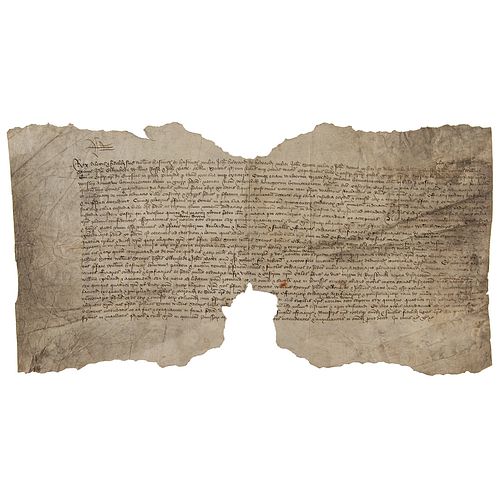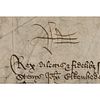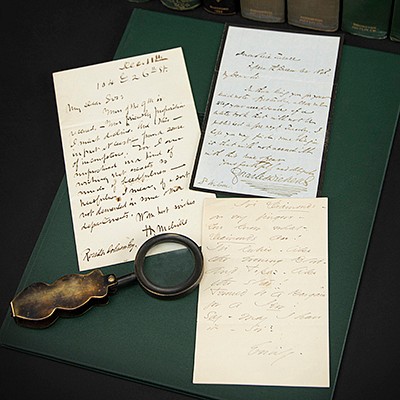King Edward IV Document Signed
Two ways to bid:
- Leave a max absentee bid and the platform will bid on your behalf up to your maximum bid during the live auction.
- Bid live during the auction and your bids will be submitted real-time to the auctioneer.
Bid Increments
| Price | Bid Increment |
|---|---|
| $0 | $5 |
| $50 | $10 |
| $200 | $25 |
| $500 | $50 |
About Auction
Oct 12, 2022
RR Auction support@rrauction.com
- Lot Description
King of England (born 1442) from March 4, 1461, to October 3, 1470, and then again from April 11, 1471, until his death in 1483. He was a central figure in the Wars of the Roses, a series of civil wars in England fought between the Yorkist and Lancastrian factions between 1455 and 1487. Exceptionally rare vellum manuscript document signed by Edward IV, one page, 16.25 x 8.5, 1471. The king authorizes a draft commission, which reads, in part (translated from Latin): “The Crown to Williams Hastinges of Hastings, kt, John Howard of Howard, knight, John Scotte, knight and John Donne, knight, and to John Thrish, John Blount…John Yonge, William Stenys, John Elkenhede, William Rosse and John Batte. Recites: Richard [Neville] Earl of Warwick was for the term of his life captain of the town and castle of Calais, of the tower of Rysbank and of the Marches of Calais and of the castle of Guines in Picardy; he appointed Walter Wrattesley, kt, as his lieutenant of Calais, Roland Worsley, esquire, as lieutenant of the tower of Rysbank and Richard Whetehill, esquire, as lieutenant of the castle of Guines; he died on 14 April last [1471]. After his death both Walter, Roland and Richard, and all of the officers, soldiers, artificers, and pensioners whom he had retained have been and remain in attendance. Furthermore in his lifetime Richard Earl of Warwick established 500 soldiers beyond the ordinary number, to attend in return for various wages and rewards, and certain others to attend at Guines; they for the greater part have been in attendance since 25 March last and remain so. The Crown now appoints two or more of the addresses (of whom Sir John Scott, William Stevys, John Elkenhede or John Batte must be one) to call Walter Wrattesley, Roland Worsley, Richard Whetehill and the ordinary and extraordinary establishment before them, take a view of them and enquire of each of them concerning their custody of the town, castles and towers during that period, and to make an account with them. William Hastings is granted the power and authority to discharge and remove all the soldiers of the extraordinary establishment and as many of the ordinary establishment of the town and castle of Calais and the tower of Rhysbank according to his discretion, with power to discharge or retain as he sees fit, and to certify the names and payments to the Treasurer and Barons of the Exchequer under seal.” Signed in the upper left corner by King Edward IV as ‘Rex Edwards,’ and endorsed on the reverse with the names of eight members of the council present when it was granted: “My Lord of Clarence, The Lord Hastynges, The Lord Duddele, The Lord Howard, [Mr.] John Alcok, Mr. John Russell, Richard Fowler, Mr. Richard Martyn.” In good to very good condition, with heavy soiling, a short tear to the right edge, and obvious loss which affects some of the body of the document. Accompanied by a later transcription of the document. Already appreciably rare as an early commission signed by King Edward IV, this example's desirability is furthermore enhanced by its historically significant subject matter—documents regarding the English possession of the French territory Calais are of the utmost rarity and are seldom seen.
- Shipping Info
-
Bidder is liable for shipping and handling and providing accurate information as to shipping or delivery locations and arranging for such. RR Auction is unable to combine purchases from other auctions or affiliates into one package for shipping purposes. Lots won will be shipped in a commercially reasonable time after payment in good funds for the merchandise and the shipping fees are received or credit extended, except when third-party shipment occurs. Bidder agrees that service and handling charges related to shipping items which are not pre-paid may be charged to a credit card on file with RR Auction. Successful international Bidders shall provide written shipping instructions, including specified Customs declarations, to RR Auction for any lots to be delivered outside of the United States. NOTE: Declaration value shall be the item’(s) hammer price and RR Auction shall use the correct harmonized code for the lot. Domestic Bidders on lots designated for third-party shipment must designate the common carrier, accept risk of loss, and prepay shipping costs.
-
- Buyer's Premium



 EUR
EUR CAD
CAD AUD
AUD GBP
GBP MXN
MXN HKD
HKD CNY
CNY MYR
MYR SEK
SEK SGD
SGD CHF
CHF THB
THB












